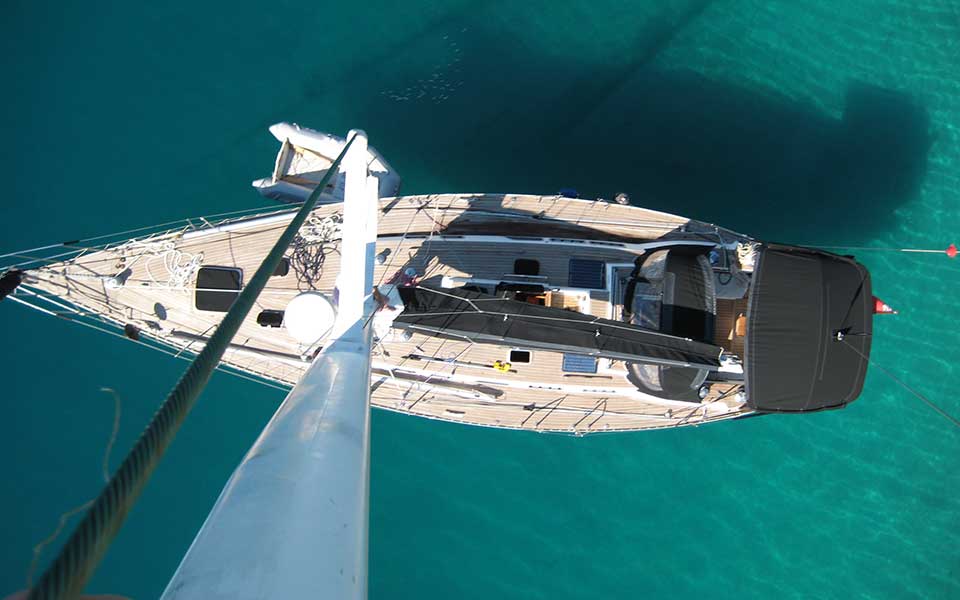Some 45 years ago, Roulette, an old 6-meter boat Rod Heikell had bought for 800 pounds from an advertisement, using all of his savings, was setting sail from Yarmouth, England for its great journey to the Mediterranean. It was made of plywood, had cotton sails and a 4HP diesel engine that worked whenever it fancied; it also did not have a battery or generator, safe for a gas lamp for light and a hint of warmth for the evenings. Finally, it had a compass and some maps that bore a red stamp indicating “unsuitable for navigation.” Yet the 27-year old sailor had an insatiable desire for sea adventures, nurtured by his readings of the Odyssey as a young man, by a relative naivete and ignorance of the dangers of life at sea and changeable weather, as well as something deeper that had left its “mark.”
He had been diagnosed with an aggressive form of melanoma just two years previously, and doctors had given him just two years to live. “My diagnosis was the spark that lit the fire for this journey on a small boat into the Mediterranean. I wanted to see something of the old Europe, the lands I knew from books and the civilizations I knew nothing about; I wanted to learn more about the people living on the Mediterranean coast,” he states in “Accidental Sailor,” the more autobiographical of his books (he has written over 20).
The plan was to cross the English Channel and arrive at Saint-Malo, to enter the canals in Brittany and reach the Bay of Biscay; he would then move south along the coast until Bordeaux, for a brief foray into the Canal de Garonne and Canal de Midi, before entering the Mediterranean Sea, where he would sail to Corsica, Italy and finally, to Greece. Yet this journey very nearly stopped before it had actually begun… two days after setting off, Roulette faced terrible weather on the Roches Douvres reefs, 50 miles off course, with no sight of land on the horizon.
Rod was quasi “shipwrecked” in his cabin, exhausted, disappointed and seasick. At some point Bridget, his partner on this youthful expedition, sounded the alarm: “You must take the wheel, I cannot take this anymore.” Rod pulled himself together, was sick over the railings, grabbed the boat’s wheel and something short of a miracle happened. He regained control of the vessel. “Since that experience I have been dizzy at sea, but I have never, not once, abandoned my post.”
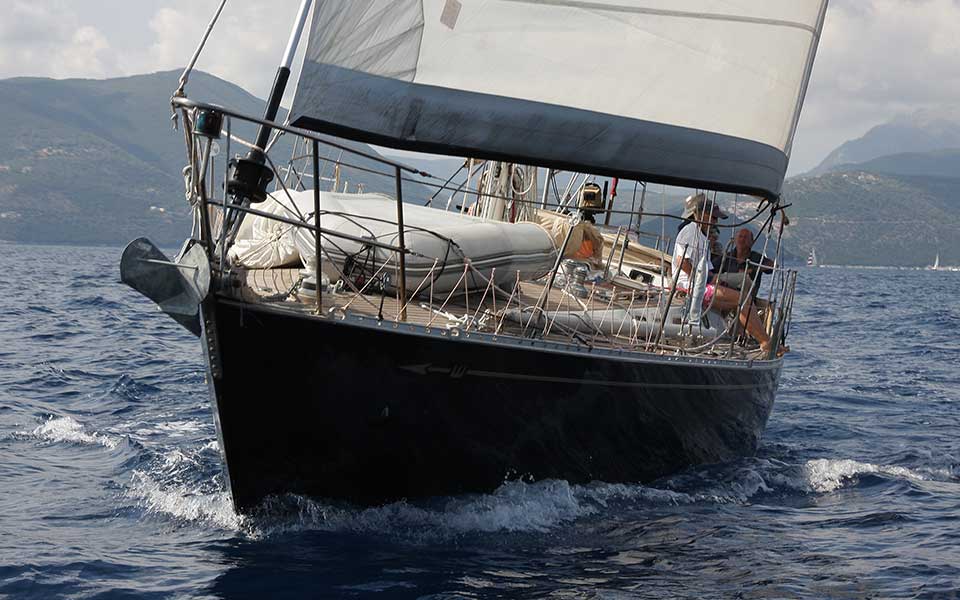
Rod grew up in New Zealand and his family’s only connection to the sea was… a scandal: his grandfather had defected from a Finnish whaling boat! He sailed occasionally, he took part in races but was not very good, and the first time he was in charge of steering a vessel – owned by a family of doctors who employed his mother as a cleaning lady – was probably traumatic, featuring clumsy manoeuvres and (again) acute seasickness. Yet instead of discouraging him, something magical happened one night as he steered the vessel, while everyone else had gone to bed: he felt the unique sensation of freedom and fell instantly in love with the sea, to which he was destined to dedicate his life.
He sailed around the world, traversed oceans, explored the Mediterranean on multiple occasions and developed a profound connection to Greece – the object of his life’s work. It was approximately 1980 when, once more with an ignorance of the dangers involved, he decided to write a sailing guide on Greece. Forty years later, and Greek Waters Pilot is in its 13th updated edition (the most recent one dates from 2018), a reference point for amateur and professional sailors. The books cover the entire country, from the Ionian to the Aegean, Rhodes and Crete, and includes details on more than 450 gulfs, harbors and bays in one volume.
“The exciting general information and historical and mythological references give the book a wealth that is rare for sailing guides. It is inconceivable to visit Greece without the detailed knowledge that comes from Heikell’s experience on the Greek seas,” the legendary Royal Cruising Club says about Greek Waters Pilot.
In 2016, Sailing Today awarded Heikell with a Lifetime Achievement Award for his work.
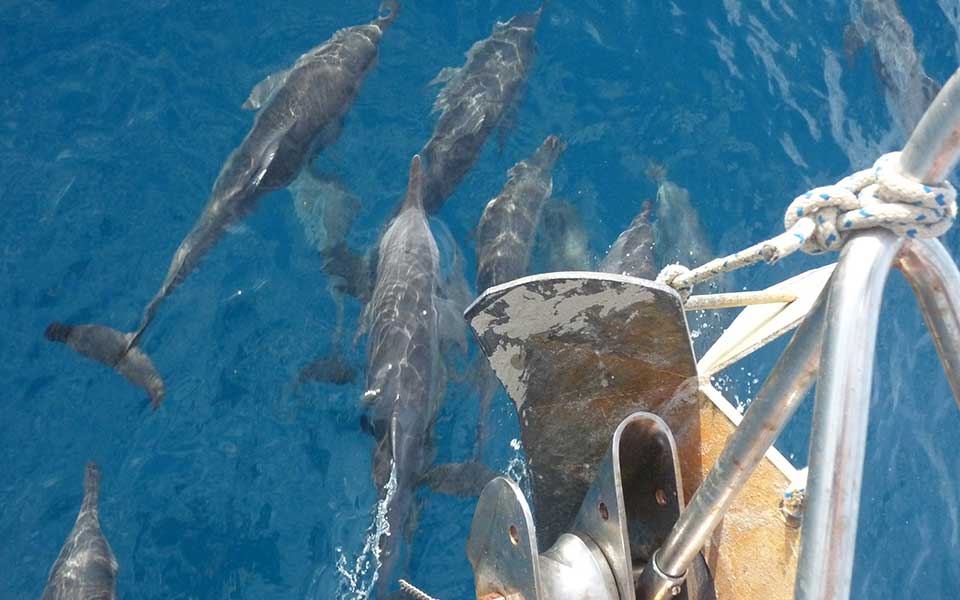
For the last 20 years, Rod has been sharing his life, travels and work with Lucinda, who happened to be searching for her own sea adventure at the time Rod was looking for crewmembers to sail with him from the Azores to Gibraltar. The journey was tough, the boat’s cabin was leaking water from the deck: “Not the most romantic of situations, quite the opposite!” as he tells me. “We reached our destination and I was certain that we would never see each other again,” he adds. “But I had had a wonderful time!” Lucinda interjects with her biggest smile.
We met virtually; they were in England, I was in my office, a while before trips started up again and an incredibly long time since they had last seen their floating home, Skylax. Designed in New Zealand by master Alan Warwick, Skylax is a classic 46-foot single keel boat that has sailed the seas and oceans for the last 20 years.
“It is in a shelter in Koilada… we are also building a house in Galatas, you know. The funny thing is that the first time I had come to Greece, with Roulette, my plan was to sell the boat, return to New Zealand by plane and get a normal job. But I happened to get a job in a chartering company, and my departure kept getting postponed. Before I knew it, it had been five years and I had already started researching the sailing guide. At some point, I said to myself: “You know what? Maybe I won’t go back to New Zealand after all.”
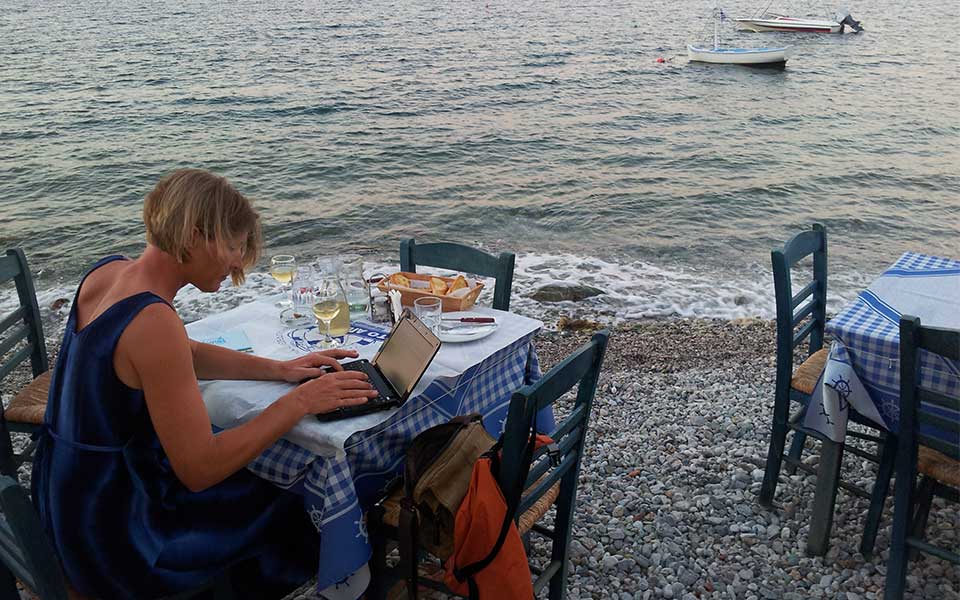
So how does a life like yours, a life at sea, shape a person’s personality?
Rod: At sea you are never certain about what is going to happen, yet you must be ready to deal with whatever may happen. Setting your course, adjusting the sails, avoiding any pitfalls or difficulties and seeking refuge in calm bays when things get tough. I think sailing is one of the few situations where man is entirely responsible for his destiny, simply because there is nobody else around. You need to be self-sufficient and independent, but not arrogant. You must respect mother nature and the sea.
Lucinda: For me, it is the incredible sense of freedom. Particularly in the beginning of any journey, once you have filled your boat with supplies, you know that you can go anywhere. It is the same feeling whether you are on a boat in a lake or whether you are crossing an ocean. Of course, the other thing that life at sea teaches you is humility. When you are excessively confident and not paying attention to the smallest details, that is when something usually goes wrong.
Rod: Any sailor who claims that they are never afraid is naive. I remember we fell on a typhoon once as we crossed the ocean; the sky was pitch black, the waves terrifying, we were terribly frightened until we managed to stabilize the boat. Two days later, we were sailing on calm waters and reflected: “It wasn’t that bad, we are still alive.”
Lucinda: Sailors have short memories. You may have had the most awful journey, and vow to yourself “I’m never doing anything like that again” once you have docked in a port. Then, the next day, after having relaxed and had a drink, you cannot wait to get out to sea again.
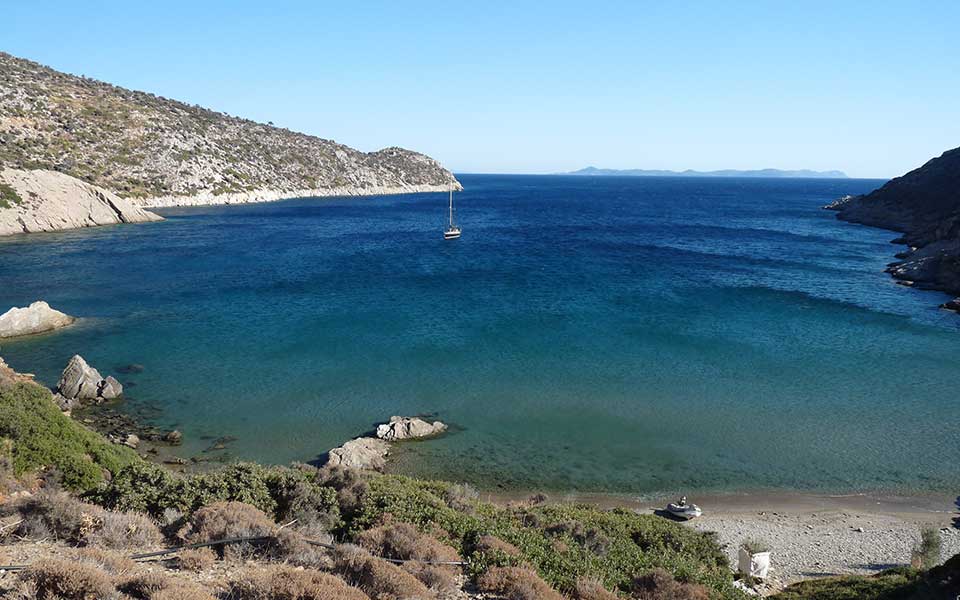
Do people become more frugal after living in confined spaces for long periods of time?
Rod: It is not a matter of quantity. The food you prepare is more delicious when you are at sea. You experience it as a celebration of flavor, much more than when you are on land and have access to everything. Even the simplest things, such as a glass of water, can seem like nectar. Once we were crossing the Indian Ocean with a cousin of mine, and the boat did not have a fridge. It was 1996. Well, I still remember the taste of the ice-cold beer we drank when we finally made it to shore. It was as if I was tasting beer for the first time. So in a way, you learn how to appreciate the small, simple things in life. Usually, during long crossings, it is both Lu and me taking turns to sleep and steer the boat in 3-hour shifts. This continues for weeks. The first night we spend on shore and even though everything has gone well, we often wake up in the middle of the night in a panic, asking “who is at the wheel”?
Why would someone want to traverse the ocean in a small boat?
Rod: I know it sounds trite, but it is simple: because there is an ocean, and people always want to explore new places – I do not mean by cheating, namely loading your boat on a ship and being taken across. The chances of meeting another boat during the crossing are slim to none, but you are not alone; you communicate with others on the radio, you care for them, and worry if you have not heard from them for 2-3 days. It is a special type of camaraderie. And it usually ends in a huge party on the coast!
Lucinda: It is interesting to meet sailing crews from Australia or New Zealand in the Mediterranean. It is as if the imaginary elastic band that connects them to home is almost broke; they are on the other side of the world and you can almost feel their desire to get out to the ocean again. In a way, they seem like fish out of water. For instance, New Zealanders have to get on a 4-hour flight to get to Sydney, which is not a massive cultural change. In Europe and the Mediterranean in particular, there are so many countries, people, so many different cultures in a relatively small expanse of land. Even on a boat, in just one day you can go from Italy and Greece, or from Greece to Turkey, and you are in completely different worlds.
Rod: I think Europeans do not appreciate the wonder of Europe as much as we do, coming from so far away. Because in my eyes, it is a miracle that you can be in another country, another civilisation within a few hours, and perceive the difference from the first moment. For instance, there is no way that you could confuse Croatia with Greece, or Greece with Italy.
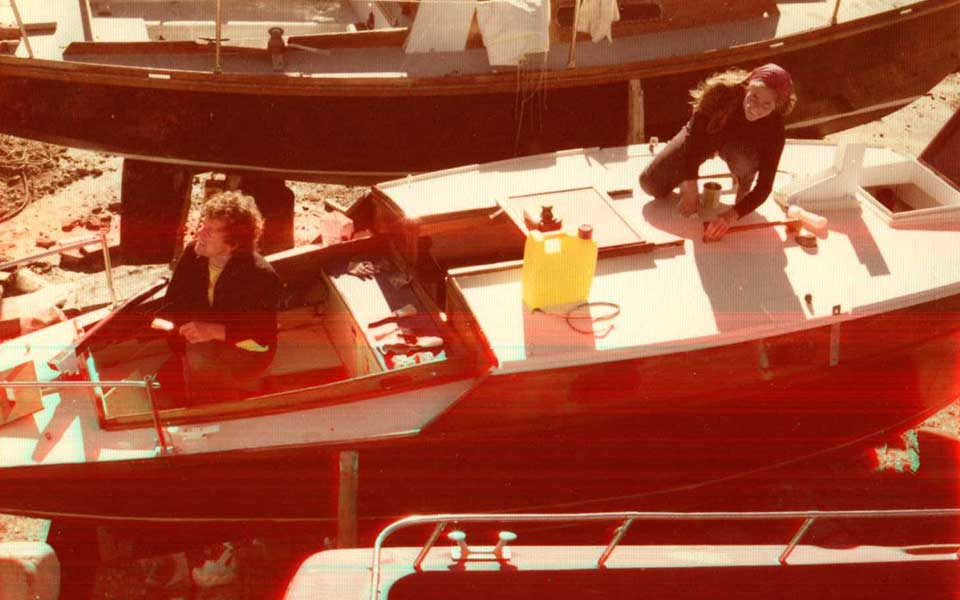
Is it true that your love for Greece started with a school project about the Odyssey?
Rod: It was a time when you could not just Google it; you had to read, write, draw sketches, paste pieces and create something like a journal – it is this process that engages your mind and ideas imprint themselves in your memory much more than in the age of the Internet. The Odyssey was also the first book I gave to Lu when we met. Odysseus is the type of anti-hero that I love, because you know, he is not perfect, he has his flaws, and we can all identify with that.
How did the idea of a New Zealander writing sailing guides for Greece come about?
Rod: After the first trip to Greece with Roulette, I had found a job working for boat chartering companies, in the Saronic Gulf and the Ionian Sea, etc. And so I began conducting some research, for instance on Spetses, recording every bay and sketching the maps by hand. I then started adding information about the history of each place and suggestions about what you could do ashore, and the company I worked for would print them as leaflets. So I had the bright idea of writing a book about Greece before returning to New Zealand and in a way, 40 years later, I am still writing it! During the day I would keep detailed notes, and in the evenings I would type them on a typewriter, making corrections with tippex. Generally, I was very naive as I had do idea how exhausting it would be! The first edition was finally published in 1982.
Is the process still “handcrafted” today?
Rod: As unbelievable as it may sound, yes. It seems easier to us to sketch a map by hand instead of using the laptop.
Lucinda: Another thing that has not changed is the need to get out at the port and keep notes, taking care to not make any informational mistakes, but also to convey the sense of the place. It is not just about recording the depth of waters in the port, or the precise location of a rock. When you read travel pieces, you understand whether the writer has actually been there or not, and that is the purpose. To convey a true image of a place, even if it is not always flattering. Whether it has changed over the years, whether a port is dirty or too noisy… Keeping things constantly updated is a challenge.
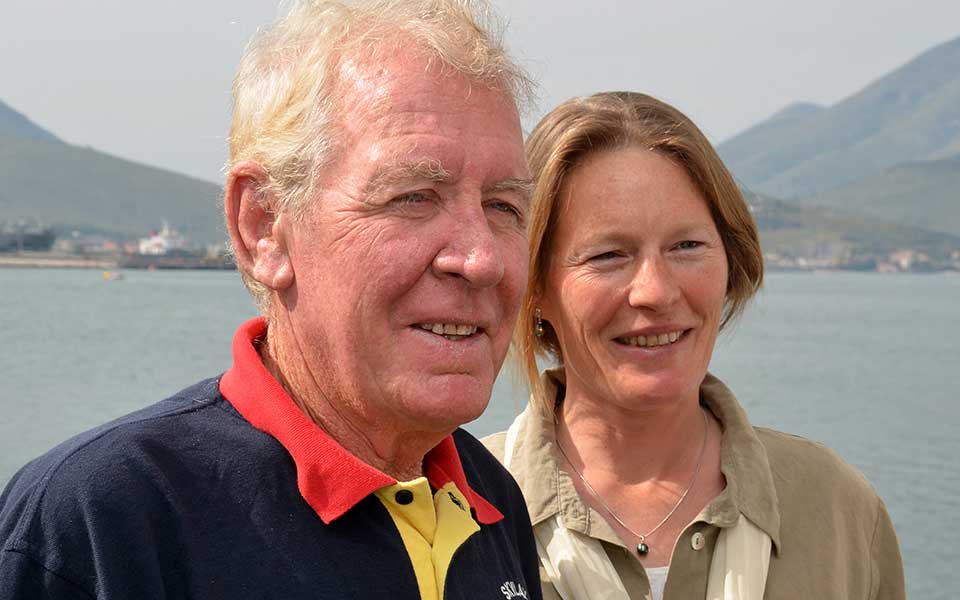
Have you been to all the Greek islands?
Rod: I would say yes; the question is how many times have we been to each one, and when did we go there last. But I would have trouble thinking of an island we have never visited.
Are there any favourite spots you do not mention in your book so that they remain “yours”?
Together: No, that is not true! (laughter). We mention them, it is just that even in sailing there are people who choose to take the “beaten path” and others the “road less traveled.” There are so many beautiful places in Greece that, even during peak season, you could go somewhere and be totally alone.
Lucinda: You cannot include ALL the spots, because the book would be four times as large. You include the most interesting, the safest, the most beautiful. It is funny when sailors come up to us and say “I discovered this great spot, it’s not in the book.” Even so, we all have our favorite spots and places. It is usually the ones that, when you stop thinking, come to mind as a flashback.
Rod: There are places that become part of your history, because you visit them over and over again for decades, and one of those is Poros – we actually bought a plot of land opposite the island to build our house on. I have been visiting Poros since 1977; I saw children grow, get married, have children of their own; I saw friends grow old, others pass away – the entire circle of life. A favourite place is where people know you and you feel part of the community – it is not necessarily the most beautiful, but somewhere you have a deep connection to.
Lucinda: It is wonderful to return to a place after five, or even ten years, go to the same taverna and be greeted with joyful exclamations: “Heey! Where have you been?” This is an important element that makes Greece so special – hospitality, caring about others, the love for people.
Rod: … and the fact that there is a taverna! It may sound funny but if you are in the South Pacific for example, everything is wonderful – sandy beaches, palm trees, coral reefs. But most of the time I wish for a nice little taverna to bring everything together…
Have people changed over the years? Is this purity and innocence being lost?
Rod: To a certain extent, this is natural and unavoidable; on the other hand, it makes me angry when people romanticize life in the past. They may have gotten rich, but they want the others to remain “pure” in the countryside. Times and people may change, but the basic principles of filotimo (sense of pride, dignity, respect and thoughtfulness) and filoxenia (showing hospitality to strangers) are still here. And this is not the case in any other place I know. Having someone say “Don’t worry about it, you can pay tomorrow,” or “grab a chair and join us at our table” simply does not happen anywhere else. It took me a long time to understand the Greek way, but when I finally got there, I fell in love with it. It is a way of life that I like.

